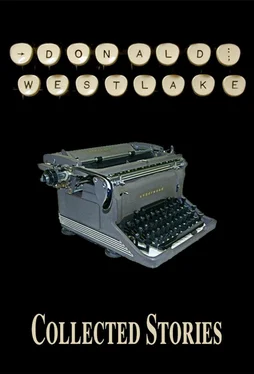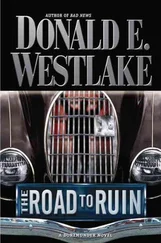Дональд Уэстлейк - Collected Stories
Здесь есть возможность читать онлайн «Дональд Уэстлейк - Collected Stories» весь текст электронной книги совершенно бесплатно (целиком полную версию без сокращений). В некоторых случаях можно слушать аудио, скачать через торрент в формате fb2 и присутствует краткое содержание. Год выпуска: 2020, Издательство: Jerry eBooks, Жанр: Фантастика и фэнтези, Детектив, short_story, на английском языке. Описание произведения, (предисловие) а так же отзывы посетителей доступны на портале библиотеки ЛибКат.
- Название:Collected Stories
- Автор:
- Издательство:Jerry eBooks
- Жанр:
- Год:2020
- ISBN:нет данных
- Рейтинг книги:5 / 5. Голосов: 1
-
Избранное:Добавить в избранное
- Отзывы:
-
Ваша оценка:
- 100
- 1
- 2
- 3
- 4
- 5
Collected Stories: краткое содержание, описание и аннотация
Предлагаем к чтению аннотацию, описание, краткое содержание или предисловие (зависит от того, что написал сам автор книги «Collected Stories»). Если вы не нашли необходимую информацию о книге — напишите в комментариях, мы постараемся отыскать её.
Collected Stories — читать онлайн бесплатно полную книгу (весь текст) целиком
Ниже представлен текст книги, разбитый по страницам. Система сохранения места последней прочитанной страницы, позволяет с удобством читать онлайн бесплатно книгу «Collected Stories», без необходимости каждый раз заново искать на чём Вы остановились. Поставьте закладку, и сможете в любой момент перейти на страницу, на которой закончили чтение.
Интервал:
Закладка:
At precisely noon on the fatal day, the president of the Smith Wrecking and Salvage Company, a man named Smith, personally pushed the plunger that set off all the dynamite inside the building.
To get an idea of what happened then, consider the jet plane. A force is created in the bowels of the plane, a force that is constricted on all sides but one by sturdy walls of metal. Only to the rear is there a clear course. Oddly enough, force prefers the easiest road; and so it streams roaringly out the tail of the jet plane, pushing it forward.
Something along the same lines happened within the City Hall of Lewiston, Massachusetts. A tremendous amount of force was suddenly born within those indestructible walls and found itself restricted almost everywhere by fluoryl plastic. Only through the windows, whose glass had been long since smashed by frustrated wreckers, could the force find an exit from the place of its birth and a portal to the great world outdoors.
All the force of the explosion, then, went swooshing out the windows; and all the frame houses around the City Hall fell over on their sides with a despairing crump! Brick or stone houses flew apart and took off in thirty different directions all at once. Within a radius of about a block and a half, the skyline was suddenly lowered to basement level.
Not that the rest of the town was spared. Walls suddenly folded inward; doors were torn off their hinges all over the city; people were picked up and carried a few blocks by the blast and cameras flew everywhere.
A survey taken later that day showed that only two windows remained intact in Lewiston; and one of these was subsequently shattered by a small boy who was beginning to develop complexes from seeing that one intact pane of glass surrounded by only the jagged reminders of panes of glass.
The other one was broken a week later by a workman, who was putting a pane of glass in an adjoining window, when he fell off his ladder.
Of course, the explosion cost the Smith Wrecking and Salvage Company every cent it could convert its equipment into, and more besides. But the City Hall still stood unscathed, untouched, undamaged and untroubled by the blast that had emanated from itself to flatten the surrounding territory pretty thoroughly, and put the Smith Wrecking and Salvage Company into receivership — an unusual example of man bites dog. The last threat to the life of the City Hall of Lewiston, Massachusetts had been foiled.
The City Council, in order to pay for the wasted architect’s fees — and the other miscellaneous expenses of the proposed but never-to-be-completed new City Hall, blocked off the street in which the City Hall stood alone and untarnished; turned the waste land into a parking lot; and charged tourists twenty five cents each to drive in, park and look at the Indestructible Building. For another quarter, the tourist could go inside the City Hall, wander around looking at the walls and so forth and get, absolutely free, a tiny block of fluoryl plastic for a souvenir.
Because of the publicity, the tourist trade doubled within the next few months and practically every tourist wanted the whole works. In time, this became the city’s principal source of income, and taxes were lowered point three zero one per cent, which effectively quieted the conservative element.
Later on, another gimmick was thought of. For an additional fifty cents, the tourist could bring his little hunk of fluoryl plastic into the Mayor’s office; he would autograph it for the tourist personally, with the tourist’s own name on it and a little greeting from the Mayor. This went over so big that within three years the city built, debt free, a mammoth football stadium, just for the fun of having a mammoth football stadium. And every Saturday during football season the local high school played somebody called the Visitors in the mammoth football stadium that held five times as many people as there were in the whole town of Lewiston; everyone sat in the abominably hard fluoryl plastic stands and got a tremendous kick out of it. Oh, yes, the mammoth football stadium, was made of fluoryl plastic. It was indestructible, too.
1959
And Then He Went Away
There was one trouble with artist Emory Ward’s depiction of futuristic machines and gimmicks…
Emory Ward sat hunched over his drawing board, manipulating compass and ruler and pencil. If he could get the illo roughed out by lunchtime, he could begin working with color in the afternoon. He sat hunched, weighed down by a deadline, and bit his lower lip as he drew.
The doorbell rang.
“Damn,” said Ward. He reached for the gum eraser, corrected, drew another line. The doorbell rang.
“Fry in hell.” Ward shifted on the chair, irritable, annoyed at the outside sound. He drew lines, measured angles.
The doorbell rang.
“Disconnect it,” muttered Ward. As he drew, he grumbled about the sound and its maker. Salesman, paper boy, somebody meaningless and unimportant, a cipher, non-entity, nobody, mass man…
The doorbell rang.
“Nobody home, nobody home,” Ward whispered desperately. “Go away.” He’d have to put down his tools, straighten, stand, walk to the door, open it, walk down the hall, down the stairs, across the front hall, open the door, listen to words, say, “No, thank you,” close the door, climb the stairs, walk down the hall, open the door, come into the room, close the door, cross to the drawing board, sit down, pick up his pencil and protractor and compass, put them down, light a cigaret, be angry, go back to work — total loss, ten minutes.
The doorbell rang.
“No,” grated Ward. “I will not.” He shut his ears, turned off all the circuits of his mind except those connected with his work, drew lines, measured, drew.
Someone knocked on the door.
Emory Ward stiffened. He stared at the wall. He thought indignantly, someone is outside the door. The upstairs door, this door, in my house, knocking on the door while I am trying to meet a deadline.
The door opened.
Ward’s back was to the door. He turned slowly, ready to tongue-lash an insurance salesman, browbeat a paper boy, utterly demolish a collector from the United Fund.
The visitor was tall and slender, with white hair, impeccably dressed in gray flannel surmounted by a thin face with thin smiling lips, and he said, “Mister Emory Ward?”
“Listen,” said Ward.
“I am Gamble Two,” said the visitor. “I am from, the twenty fifth century.”
Ward got to his feet. “I am going to kick you downstairs.”
“I will erect a force field around myself,” the visitor told him. “Then I will put you in a temporary state of paralysis. Very flamboyant. I would rather we sat and chatted like gentlemen.”
Ward advanced.
“I will kill you.”
The visitor smiled and disappeared. A voice said, “Please be sensible, Emory Ward.”
Ward stared at the doorway. “Listen,” he said. “Listen, cut it out. I got a deadline.”
The visitor reappeared. “Five minutes. Five minutes. No more, I promise.”
Emory Ward took a deep breath. “You are not from the future.”
“Of course I am,” said Gamble Two. “Tell me, do I speak without an accent?”
“You are a wise guy,” Ward told him. “You are a practical joker.”
Gamble Two looked faintly pained. “May we sit and chat? I would like to explain.”
Ward looked with regret at his drawing board. “I got a deadline.”
“I promise not to take long.” Gamble Two gestured at the two chairs over by the writing desk. “May we sit?”
“You from some fan club?” demanded Ward.
“May we sit?”
Ward shrugged. “Have I got a choice?” Disgruntled, he sat.
Читать дальшеИнтервал:
Закладка:
Похожие книги на «Collected Stories»
Представляем Вашему вниманию похожие книги на «Collected Stories» списком для выбора. Мы отобрали схожую по названию и смыслу литературу в надежде предоставить читателям больше вариантов отыскать новые, интересные, ещё непрочитанные произведения.
Обсуждение, отзывы о книге «Collected Stories» и просто собственные мнения читателей. Оставьте ваши комментарии, напишите, что Вы думаете о произведении, его смысле или главных героях. Укажите что конкретно понравилось, а что нет, и почему Вы так считаете.








